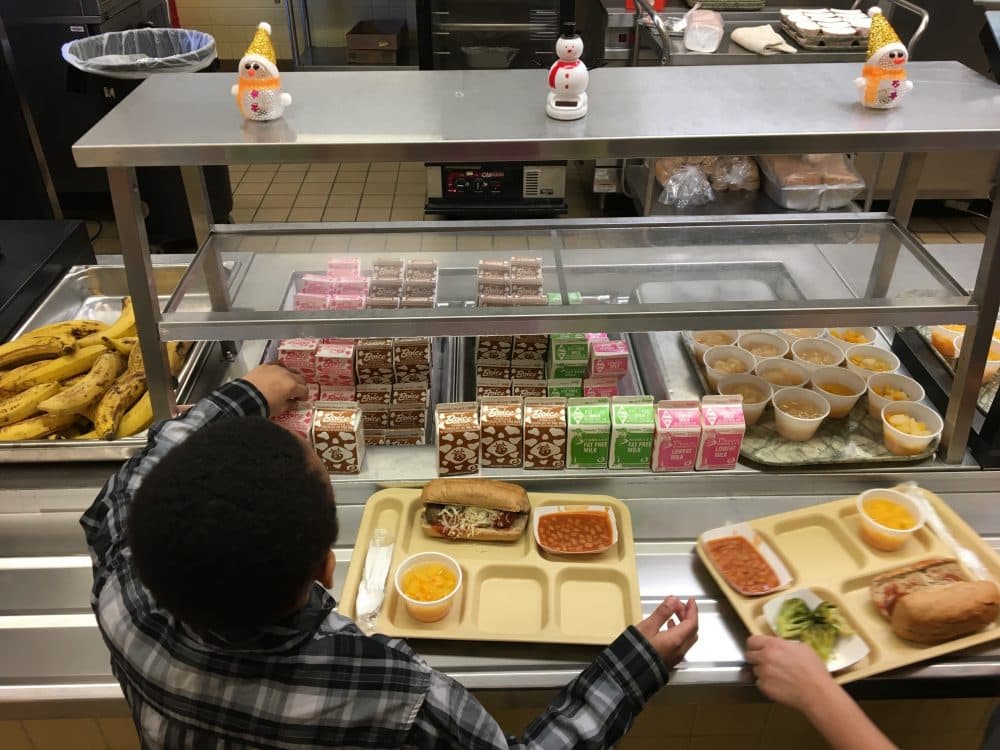Advertisement
Commentary
Mass. Needs To Stop Shaming Kids Who Can’t Afford Lunch

A child living in a low-income household stands in the lunch line at school. But when she gets to the cash register, the cashier worker looks up the student’s account and realizes that she has no money left. The worker then motions to another member of the cafeteria staff, making the letter C with her hand. The student’s hot lunch is thrown out in front of her, and she’s given a cold cheese sandwich. All of this is done in front of other students. All because that school district’s policy is designed to shame families with school meal debt.
That’s the situation that is facing dozens of families across Massachusetts, according to a recent report by the Massachusetts Law Reform Institute (MLRI). MLRI, a statewide nonprofit poverty law and policy center, conducted an inventory of 154 Massachusetts public school districts over a six-month period that do not provide universal free school meals. They found that the policies of many Massachusetts school districts toward families with unpaid school meal debt can be punitive toward children.
To be clear, the cafeteria staff are not to blame for the actions that embarrass students and contribute to their food insecurity. They are only acting in accordance with policies made by school districts and they themselves often recognize how humiliating this is for the children in their schools. Those policies have to change.
The report found that one-quarter of Massachusetts school districts with 20 percent or more low-income students do not have a school meal charge policy publicly posted anywhere on the food services web pages, in the student/parent handbooks or in school committee policies. Moreover, many of the policies are not clearly written for parents to understand.
The statistics show how challenging it can be for children living in low-income homes to access a hot lunch — 28 Massachusetts districts have established a “no charge” meal policy, which bluntly means that students without money don’t eat.
The majority of elementary and some secondary schools have “meal account caps.” When a student reaches the cap, they receive an inferior “alternate meal,” typically the cheese sandwich described above.
Twenty-seven elementary and 34 secondary school districts have policies that punish students, and often their siblings, for school meal debt — including barring them from extracurricular activities or graduation exercises.
And a number of districts instruct cafeteria or administrative staff to speak directly to a student about debt.
Worst of all, 24 school districts allow school administrators to engage collection agencies for meal debt, which invariably causes higher fees or interest, and some school districts threaten referral to the Division of Children and Families (DCF) due to meal debt.
It does not have to be this way.
Indeed, other states are taking concrete steps to address the problem of lunch shaming. In January, New York Gov. Andrew Cuomo proposed legislation that would require all school districts participating in the National School Lunch Program (NSLP) to develop a plan to ensure that a student whose family has unpaid school meal fees is not shamed or treated differently than her peers. That bill passed the New York legislature just this week. California, New Mexico and Oregon all signed laws in 2017 to either prevent shaming or provide meals to low-income children. Also last year, West Virginia’s Board of Education voted on a statewide policy to address school meal shaming. And last month, Gov. Jay Inslee of Washington signed legislation that requires schools to reach out to parents without burdening kids.
Denying children food and humiliating them because they are poor are not the values by which most residents of Massachusetts live. It threatens the educational outcomes the state has worked so hard to attain. We can stop lunch shaming in Massachusetts and by doing so, continue to be the nation’s leader when it comes to education and child welfare.
Georgia Katsoulomitis is executive director of the Massachusetts Law Reform Institute. Patricia Baker is MLRI’s senior policy analyst.